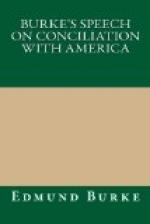Then, Sir, from these six capital sources—of descent, of form of government, of religion in the Northern Provinces, of manners in the Southern, of education, of the remoteness of situation from the first mover of government—from all these causes a fierce spirit of liberty has grown up. It has grown with the growth of the people in your Colonies, and increased with the increase of their wealth; a spirit that unhappily meeting with an exercise of power in England which, however lawful, is not reconcilable to any ideas of liberty, much less with theirs, has kindled this flame that is ready to consume us.
I do not mean to commend either the spirit in this excess, or the moral causes which produce it. Perhaps a more smooth and accommodating spirit of freedom in them would be more acceptable to us. Perhaps ideas of liberty might be desired more reconcilable with an arbitrary and boundless authority. Perhaps we might wish the Colonists to be persuaded that their liberty is more secure when held in trust for them by us, as their guardians during a perpetual minority, than with any part of it in their own hands. The question is, not whether their spirit deserves praise or blame, but—what, in the name of God, shall we do with it? You have before you the object, such as it is, with all its glories, with all its imperfections [Footnote: 29] on its head. You see the magnitude, the importance, the temper, the habits, the disorders. By all these considerations we are strongly urged to determine something concerning it. We are called upon to fix some rule and line for our future conduct which may give a little stability to our politics, and prevent the return of such unhappy deliberations as the present. Every such return will bring the matter before us in a still more untractable form. For, what astonishing and incredible things have we not seen already! What monsters have not been generated from this unnatural contention!




